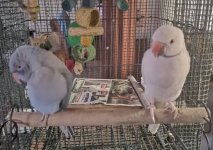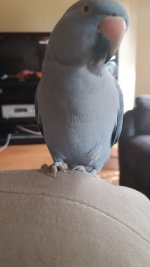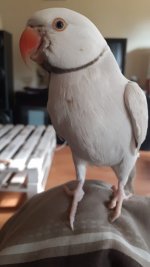Hi fellow avian guardians
Please may i ask some advice; i have two beautiful babies, Joy (3 years) & Hope (2 years) - i suspect the one is an indian ringneck, and the other an african ringneck (their builds are slightly different). I've uploaded a few pictures of them as attachments.
They were going "at it" for quite some time recently & they are very attached to one another - we cannot take the one out of the room without the other or get ready for Bird Armageddon & Burst Eardrums! But Joy (our male) is very clumsy and could never really successfully approach this mating business so we were not too stressed about it.
Boy, were we wrong. Hope laid a total of 4 eggs over 3 weeks ago - we were amazed and curious to see what the outcome would be of this. My partner placed a box (upon reseaching) in the cage for Hope to nest / hide away in, this is where the egg laying took place (as opposed to under the recliner couch which is a dangerous location that Hopey favored for a while).
Hope's behavior has changed 180, and we really miss our little bundle of love. She's aggressive and bites us relentlessly (even though we do our best to not react in any way shape or form). She sometimes even draws blood, which naturally makes us wary of handling her... she would come out and jump on us happily and then without warning chomp away, and promptly retreat back to the cage. It was very confusing the first few times, and we now step back when she wants to "jump on" rather.
But to the point now - the eggs are not hatching. Hope's spotted out the box a lot more the last couple of days, but obviously drawn by her newest patterns to return to the box after short periods of being out and about; ruffling feathers, taking a quick bath, or coming out to be fed by Joy.
Now we are at a loss at what to do. Do we remove the box out the cage but leave the eggs in Hope's line of sight?
Do we remove box and eggs in one go?
I am desperate for the cage to get a good clean, Hope's been very very good with doing her business outside the cage (it's pretty much open all day), but Joy is a little rascal and has less regard for keeping it "neat".
My partner is reluctant to remove the eggs as he is worried it will traumatize Hope, but my feeling is that my baby gave it her best and needs to move on now - this almost forced seclusion by sense of duty surely cannot be healthy either.
Please Avian Experts on this forum, i really would appreciate your insight and advice. These are my first pets (ever) and although i do a lot of research to try and handle them proper, i have not found a suitable response to this matter that i trust.
Thanking you for taking the time to read this and your help in advance :3:3
Pixey
Please may i ask some advice; i have two beautiful babies, Joy (3 years) & Hope (2 years) - i suspect the one is an indian ringneck, and the other an african ringneck (their builds are slightly different). I've uploaded a few pictures of them as attachments.
They were going "at it" for quite some time recently & they are very attached to one another - we cannot take the one out of the room without the other or get ready for Bird Armageddon & Burst Eardrums! But Joy (our male) is very clumsy and could never really successfully approach this mating business so we were not too stressed about it.
Boy, were we wrong. Hope laid a total of 4 eggs over 3 weeks ago - we were amazed and curious to see what the outcome would be of this. My partner placed a box (upon reseaching) in the cage for Hope to nest / hide away in, this is where the egg laying took place (as opposed to under the recliner couch which is a dangerous location that Hopey favored for a while).
Hope's behavior has changed 180, and we really miss our little bundle of love. She's aggressive and bites us relentlessly (even though we do our best to not react in any way shape or form). She sometimes even draws blood, which naturally makes us wary of handling her... she would come out and jump on us happily and then without warning chomp away, and promptly retreat back to the cage. It was very confusing the first few times, and we now step back when she wants to "jump on" rather.
But to the point now - the eggs are not hatching. Hope's spotted out the box a lot more the last couple of days, but obviously drawn by her newest patterns to return to the box after short periods of being out and about; ruffling feathers, taking a quick bath, or coming out to be fed by Joy.
Now we are at a loss at what to do. Do we remove the box out the cage but leave the eggs in Hope's line of sight?
Do we remove box and eggs in one go?
I am desperate for the cage to get a good clean, Hope's been very very good with doing her business outside the cage (it's pretty much open all day), but Joy is a little rascal and has less regard for keeping it "neat".
My partner is reluctant to remove the eggs as he is worried it will traumatize Hope, but my feeling is that my baby gave it her best and needs to move on now - this almost forced seclusion by sense of duty surely cannot be healthy either.
Please Avian Experts on this forum, i really would appreciate your insight and advice. These are my first pets (ever) and although i do a lot of research to try and handle them proper, i have not found a suitable response to this matter that i trust.
Thanking you for taking the time to read this and your help in advance :3:3
Pixey
Attachments
Last edited:


